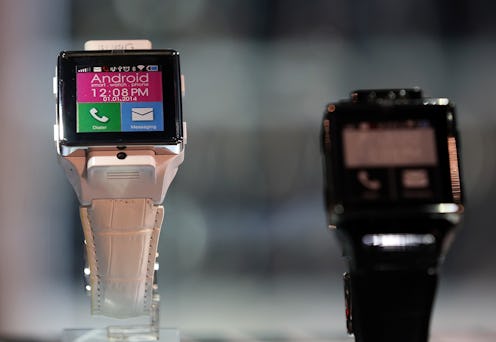With the Apple Watch upon us and a plethora of wearable tech options available, can premium brands truly compete in this market? Can high-end brands create "luxtronic" smart accessories that last and avoid becoming outdated, due to the speed at which the tech market turns over? It's a conundrum for sure, since prestige brands aren't really about this year's model. That's what the diffusion ranges or capsule collections are for!
Let me start by saying that I love the fact that some smart accessories can help save your life or improve your health, but everything feels plugged in. And that's when I start to get anxious, because I feel like I can't escape my smartphone, which I deem an "electronic handcuff."
A new wearable tech report, published at TechCrunch, asks a lot of questions, but what I'm most concerned with is the idea that all jewelry and accessories will be intelligent someday, and that presents a problem for prestige labels.
While a portion of the report comments on how cheap, outsourced versions and standard watchmakers will try to get in on the fun (and the cash) in the smartwatch marketplace, I zeroed in on a deeper point that had not previously occurred to me.
The writer notes, "As we well know technology is hiding deeper and deeper into the things we use and with a strong enough battery, a seamless interface, and a sense of aesthetics we can safely assume that much of what we now call jewelry will soon be intelligent."
Remove the sarcasm and that feels very much like a reality. You can never miss a call because your bracelet will tell you it's incoming. Doesn't that make you feel… captive?
The story hits on the point that electronics can become obsolete within a year or two, replaced by the next big thing or technological advancements, whereas luxury items are meant to be investment pieces that you keep, wear, and use for years, with fast-fashion reserved for the young, the budget-challenged, and the right now.
Wouldn't it be nice for the high-end houses to ignore this trend and continue to do their thing? Maybe or maybe not.
The piece notes, "When you buy a Birkin bag you are potentially buying a better bag for your money. You are also buying the story of the Birkin bag – Hermès CEO Jean-Louis Dumas sat next to Jane Birkin on a flight and she was complaining about her bags so Hermès made her a special one. You’re also buying the materials, the workmanship, and a multi-million dollar marketing spend. The result is a perfect storm of marketing power."
B-I-N-G-O. With smart accessories, it's about what's hot now and will be forgotten when the next big thing cruises into our lives. That's pretty much the antithesis of the luxury accessories ethos.
Will the luxe companies like Hermes, Alexander McQueen, and Louis Vuitton be able to keep up? They are known for crafting timeless pieces, not trendy ones.
Do these brands want to embed a chip or technology into a bag only to have become obsolete in two years? Can it be replaced and updated? Or will cutting into the lining of the bag destroy the leather, so to speak? Moreover, does the owner give enough of a hoot to make the upgrades?
With Mezzi creating a smart bag with a GPS at a much more mid-level cost, it'll be time that tells us how effectively the luxe market will factor into the smart one. While this market begins to boom, we'll know soon enough, methinks.
Images: Giphy (3); Getty (1)
